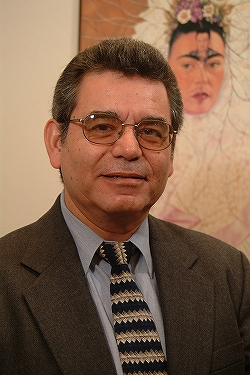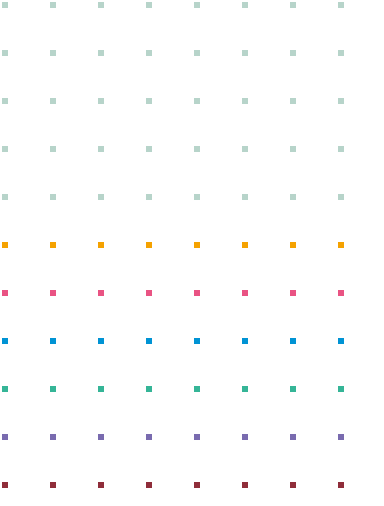11/27「日米比較政治論」のゲストスピーカーとして UCLAのDr. Haroをお招きします。
後期の授業「日米比較政治論」における11月27日(木)3時間目のゲストスピーカーとしてUCLAのDr. Haroをお招きすることにしました。
なお来日に際し、シラバスを多少変更し、先生の来日以前に予備知識として紹介できることはできるだけ話したいと思っているので、関心のある学生は後期の授業をできるだけ履修してください。
なお来日に際し、シラバスを多少変更し、先生の来日以前に予備知識として紹介できることはできるだけ話したいと思っているので、関心のある学生は後期の授業をできるだけ履修してください。

Carlos Manuel Haro, Ph.D.
Dr. Haro and his family have been residents of the City of Montebello since 1977. He has a long history of public service and now serves on the Beverly Hospital Board of Directors and is also President of the Montebello - Ashiya Sister Cities Association. Raised in the Boyle Heights area of East Los Angeles, he graduated from Roosevelt High School and then attended UCLA, where he received three degrees, including a doctorate from the UCLA Graduate School of Education. He joined the staff of UCLA in 1975 and remained with the university his entire professional career.
Other community and public service includes a term on the State Bar of California, Committee of Bar Examiners, appointed as a public member by the Board of Governors, State Bar. In 1980, he was appointed by Superior Court Judge Paul Egly to serve on the Los Angeles School District Desegregation Monitoring Committee, and in 1981 he served as chair of the committee. He was on the Board of Trustees of Immaculate Heart College Center for eleven years and for seventeen years he was a member and chair for two terms of the Board of Directors, La Clínica Familiar del Barrio, the health services clinic that became AltaMed Health Corporation in 1990.
In 2008, Dr. Haro retired from UCLA after 32 years on the staff during which he served as the Assistant Dean of UCLA’s International Studies and Overseas Programs for eighteen years, and as Program Director of the UCLA Chicano Studies Research Center (CSRC) from 1975-1983, and then as Assistant Director of the Center from 2002-2008. Dr. Haro now serves as Assistant Director Emeritus and as Postdoctoral Scholar in Residence at the UCLA CSRC.
Upon his retirement from UCLA, the CSRC established The Carlos M. Haro Scholarship Fund to support UCLA graduate students conducting research in the area of Chicano education. There is also a special archival collection at UCLA, The Carlos M. Haro Collection on the Crawford Desegregation Case. The collection was donated to the UCLA Chicano Studies Research Center Library and Archive and includes materials that Dr. Haro collected for the research he was conducting for the publication Mexicano/Chicano Concerns and School Desegregation in Los Angeles (1977), and materials he compiled while on the Los Angeles School Desegregation Monitoring Committee (1980-1982).
Professional Experience
From 1984 to 2002, Dr. Haro served as Assistant Dean for International Studies and Overseas Programs (ISOP), at UCLA. ISOP was established on July 1, 1984, to coordinate interna¬tional and foreign area studies research, teaching, developmental and public service programs at UCLA. It was comprised of eleven multidisciplinary research centers that focus on world regions, six of which were named as Title VI funded National Resource Centers, US Department of Education. As part of their research mission, the ISOP centers developed and maintained relationships with their respective foreign areas through linkages with overseas institutions of higher learning. In addition, the centers engaged in extensive community outreach through regional seminars, public lectures, and programs for curriculum development and teacher enrichment in area studies. ISOP also supported six Interdepartmental Degree Programs on international studies, including degree programs on African Studies, European Studies, International Development Studies, East Asian Studies, Latin American Studies, and Near Eastern/Islamic Studies.
Dr. Haro’s administrative responsibilities included Dean-level organizational planning and program development, coordination of ISOP faculty and academic resources, including the appointment of visiting professors, coordination of ISOP consolidation and space utilization, supervision of ISOP information technology and computing support services, ISOP center/program reviews, and ISOP support for international and foreign area studies degree programs. He was also responsible for monitoring international agreements between UCLA and foreign institutions.
Dr. Haro co-edited International Education in the New Global Era: Proceedings of a National Policy Conference on the Higher Education Act, Title VI, and Fulbright-Hays Programs in 1997. This volume represents the best thinking of more than 250 scholars, practitioners, policymakers, and foundation leaders on the status and future of international education and foreign area studies in the United States. It is the product of a national policy meeting, held at UCLA on January 23-25, 1997.
From 1983 to 2002, Dr. Haro also functioned as the Executive Director of the Southern California Consortium for International Studies (SOCCIS), an association involving twenty colleges and universities in southern California who joined together for the purpose of sharing resources and collaborating to further international studies in the region. As Executive Director, Dr. Haro’s responsibilities included planning, coordina-tion and assisting in the provision of a variety of academic and public service programs that were based on the collaboration of three or more postsecondary institutions.
Prior to assuming the position of assistant Dean of ISOP, Dr, Haro served as the Program Director of the UCLA Chicano Studies Research Center, from 1975 to 1983. In conjunction with the Center Director, he was responsible for the research and administration of the Organized Research Unit (ORU) established in 1969. CSRC administrative subunits included the Chicano Studies Research Library, the Publications Unit, the Academic and Institutional Relations Unit, the Research and Re-source Development Unit, the Academic Fellowship and Research Program Unit, and the CSRC Central Administrative Unit.
From 2002 until his retirement, Dr. Haro served as the Assistant Director of the Chicano Studies Research Center at UCLA. He coordinated the research activities of the Center, including a research grants program, a postdoctoral and graduate fellowship program, and faculty development and visiting scholar program. In addition, he undertook and directed specific education research projects and scholarly conferences at UCLA.
Dr. Haro has been a lecturer in the UCLA Graduate School of Education and with the Cesar Chavez Department of Chicana/o Studies. He continues to periodically offer summer sessions courses.
Major Conferences
In 2004, Dr. Haro organized the UCLA CSRC-sponsored conference, Mendez v. Westminster School District: Paving the Path for School Desegregation and the Brown Decision. In 2005 he coordinated the conference, The Sleepy Lagoon Case, Constitutional Rights, and the Struggle for Democracy; in 2006 he organized the symposium, Sal Castro and the Chicano Youth Leadership Conference: The Development of Chicano Leadership since 1963. He was also responsible for the Annual Latina/o Education Summit series at UCLA dealing with the educational pipeline from K-Graduate studies; in 2006, he and Education Professor Daniel Solorzano organized the Latina/o Education Summit - Falling through the Cracks: Critical Transitions in the Latina/o Educational Pipeline. The goal of the 2007 summit, California Community College Students: Understanding the Latina/o Transfer Experience Through All Segments of Postsecondary Education was to focus attention on the community college segment and Latina/o transfer students. The third CSRC Latina/o education summit, K-12 Education: What Can School Board Members and School Superintendents Do to Assure Student Success? dealt with governance and policy-making, while the fourth annual summit, held May 2009, Critical Issues for Immigrant and Undocumented Students in the Latina/o Education Pipeline focused on how policy and practices affect these students by looking at the obstacles that limit their opportunities and their access to education, the programs that serve them, and their academic success.
The recent conferences that Dr. Haro has coordinated in the Education Summit series include, 2010, the fifth summit, Funding K-12 and Higher Education: Impact on Latinos. This conference focused on the funding of public education and the impact it has on Latino students, programs and departments at every level, from kindergarten through graduate school. The 2011 summit, Building on Our Assets: Language, Culture and Education, the sixth summit, explored a significantly different approach to the education of Latina/o students: viewing their language and culture as assets that schools can use to build success. The 2012 conference focused on litigation and legislation that relate to the education of Chicanos/Latinos. The conference, Law & Policy: Conversations Across the Disciplines, was jointly sponsored by the UCLA Law School, the Mexican American Legal Defense and Education Fund, MALDEF, and the CSRC to bring together attorneys, legal scholars and social scientists --conversations across disciplines-- to focus on significant areas of intersection between Latinos’ educational needs and law and policy. The eighth annual UCLA Latina/o Education Summit was again a collaboration with the UCLA School of Law in bringing together scholars, educators, community representatives, policy makers, administrators, and students to discuss critical issues in the education pipeline. The summit, Fisher v. Texas: Implications for Latina/o Educational Diversity, specifically addressed the U.S. Supreme Court’s 2013 ruling upholding race as one factor in admissions decisions.
Education
Doctorate of Philosophy in International and Comparative Education with a Specialization on Latin America, University of California, Los Angeles. Graduate School of Education, 1976.
Master of Arts in Education with Specialization in Curriculum and Instruction, University of California, Los Angeles. Graduate School of Education, 1971.
Bachelor of Arts in Political Science with minor field in Latin American Studies, University of California, Los Angeles, 1969.
Dr. Haro and his family have been residents of the City of Montebello since 1977. He has a long history of public service and now serves on the Beverly Hospital Board of Directors and is also President of the Montebello - Ashiya Sister Cities Association. Raised in the Boyle Heights area of East Los Angeles, he graduated from Roosevelt High School and then attended UCLA, where he received three degrees, including a doctorate from the UCLA Graduate School of Education. He joined the staff of UCLA in 1975 and remained with the university his entire professional career.
Other community and public service includes a term on the State Bar of California, Committee of Bar Examiners, appointed as a public member by the Board of Governors, State Bar. In 1980, he was appointed by Superior Court Judge Paul Egly to serve on the Los Angeles School District Desegregation Monitoring Committee, and in 1981 he served as chair of the committee. He was on the Board of Trustees of Immaculate Heart College Center for eleven years and for seventeen years he was a member and chair for two terms of the Board of Directors, La Clínica Familiar del Barrio, the health services clinic that became AltaMed Health Corporation in 1990.
In 2008, Dr. Haro retired from UCLA after 32 years on the staff during which he served as the Assistant Dean of UCLA’s International Studies and Overseas Programs for eighteen years, and as Program Director of the UCLA Chicano Studies Research Center (CSRC) from 1975-1983, and then as Assistant Director of the Center from 2002-2008. Dr. Haro now serves as Assistant Director Emeritus and as Postdoctoral Scholar in Residence at the UCLA CSRC.
Upon his retirement from UCLA, the CSRC established The Carlos M. Haro Scholarship Fund to support UCLA graduate students conducting research in the area of Chicano education. There is also a special archival collection at UCLA, The Carlos M. Haro Collection on the Crawford Desegregation Case. The collection was donated to the UCLA Chicano Studies Research Center Library and Archive and includes materials that Dr. Haro collected for the research he was conducting for the publication Mexicano/Chicano Concerns and School Desegregation in Los Angeles (1977), and materials he compiled while on the Los Angeles School Desegregation Monitoring Committee (1980-1982).
Professional Experience
From 1984 to 2002, Dr. Haro served as Assistant Dean for International Studies and Overseas Programs (ISOP), at UCLA. ISOP was established on July 1, 1984, to coordinate interna¬tional and foreign area studies research, teaching, developmental and public service programs at UCLA. It was comprised of eleven multidisciplinary research centers that focus on world regions, six of which were named as Title VI funded National Resource Centers, US Department of Education. As part of their research mission, the ISOP centers developed and maintained relationships with their respective foreign areas through linkages with overseas institutions of higher learning. In addition, the centers engaged in extensive community outreach through regional seminars, public lectures, and programs for curriculum development and teacher enrichment in area studies. ISOP also supported six Interdepartmental Degree Programs on international studies, including degree programs on African Studies, European Studies, International Development Studies, East Asian Studies, Latin American Studies, and Near Eastern/Islamic Studies.
Dr. Haro’s administrative responsibilities included Dean-level organizational planning and program development, coordination of ISOP faculty and academic resources, including the appointment of visiting professors, coordination of ISOP consolidation and space utilization, supervision of ISOP information technology and computing support services, ISOP center/program reviews, and ISOP support for international and foreign area studies degree programs. He was also responsible for monitoring international agreements between UCLA and foreign institutions.
Dr. Haro co-edited International Education in the New Global Era: Proceedings of a National Policy Conference on the Higher Education Act, Title VI, and Fulbright-Hays Programs in 1997. This volume represents the best thinking of more than 250 scholars, practitioners, policymakers, and foundation leaders on the status and future of international education and foreign area studies in the United States. It is the product of a national policy meeting, held at UCLA on January 23-25, 1997.
From 1983 to 2002, Dr. Haro also functioned as the Executive Director of the Southern California Consortium for International Studies (SOCCIS), an association involving twenty colleges and universities in southern California who joined together for the purpose of sharing resources and collaborating to further international studies in the region. As Executive Director, Dr. Haro’s responsibilities included planning, coordina-tion and assisting in the provision of a variety of academic and public service programs that were based on the collaboration of three or more postsecondary institutions.
Prior to assuming the position of assistant Dean of ISOP, Dr, Haro served as the Program Director of the UCLA Chicano Studies Research Center, from 1975 to 1983. In conjunction with the Center Director, he was responsible for the research and administration of the Organized Research Unit (ORU) established in 1969. CSRC administrative subunits included the Chicano Studies Research Library, the Publications Unit, the Academic and Institutional Relations Unit, the Research and Re-source Development Unit, the Academic Fellowship and Research Program Unit, and the CSRC Central Administrative Unit.
From 2002 until his retirement, Dr. Haro served as the Assistant Director of the Chicano Studies Research Center at UCLA. He coordinated the research activities of the Center, including a research grants program, a postdoctoral and graduate fellowship program, and faculty development and visiting scholar program. In addition, he undertook and directed specific education research projects and scholarly conferences at UCLA.
Dr. Haro has been a lecturer in the UCLA Graduate School of Education and with the Cesar Chavez Department of Chicana/o Studies. He continues to periodically offer summer sessions courses.
Major Conferences
In 2004, Dr. Haro organized the UCLA CSRC-sponsored conference, Mendez v. Westminster School District: Paving the Path for School Desegregation and the Brown Decision. In 2005 he coordinated the conference, The Sleepy Lagoon Case, Constitutional Rights, and the Struggle for Democracy; in 2006 he organized the symposium, Sal Castro and the Chicano Youth Leadership Conference: The Development of Chicano Leadership since 1963. He was also responsible for the Annual Latina/o Education Summit series at UCLA dealing with the educational pipeline from K-Graduate studies; in 2006, he and Education Professor Daniel Solorzano organized the Latina/o Education Summit - Falling through the Cracks: Critical Transitions in the Latina/o Educational Pipeline. The goal of the 2007 summit, California Community College Students: Understanding the Latina/o Transfer Experience Through All Segments of Postsecondary Education was to focus attention on the community college segment and Latina/o transfer students. The third CSRC Latina/o education summit, K-12 Education: What Can School Board Members and School Superintendents Do to Assure Student Success? dealt with governance and policy-making, while the fourth annual summit, held May 2009, Critical Issues for Immigrant and Undocumented Students in the Latina/o Education Pipeline focused on how policy and practices affect these students by looking at the obstacles that limit their opportunities and their access to education, the programs that serve them, and their academic success.
The recent conferences that Dr. Haro has coordinated in the Education Summit series include, 2010, the fifth summit, Funding K-12 and Higher Education: Impact on Latinos. This conference focused on the funding of public education and the impact it has on Latino students, programs and departments at every level, from kindergarten through graduate school. The 2011 summit, Building on Our Assets: Language, Culture and Education, the sixth summit, explored a significantly different approach to the education of Latina/o students: viewing their language and culture as assets that schools can use to build success. The 2012 conference focused on litigation and legislation that relate to the education of Chicanos/Latinos. The conference, Law & Policy: Conversations Across the Disciplines, was jointly sponsored by the UCLA Law School, the Mexican American Legal Defense and Education Fund, MALDEF, and the CSRC to bring together attorneys, legal scholars and social scientists --conversations across disciplines-- to focus on significant areas of intersection between Latinos’ educational needs and law and policy. The eighth annual UCLA Latina/o Education Summit was again a collaboration with the UCLA School of Law in bringing together scholars, educators, community representatives, policy makers, administrators, and students to discuss critical issues in the education pipeline. The summit, Fisher v. Texas: Implications for Latina/o Educational Diversity, specifically addressed the U.S. Supreme Court’s 2013 ruling upholding race as one factor in admissions decisions.
Education
Doctorate of Philosophy in International and Comparative Education with a Specialization on Latin America, University of California, Los Angeles. Graduate School of Education, 1976.
Master of Arts in Education with Specialization in Curriculum and Instruction, University of California, Los Angeles. Graduate School of Education, 1971.
Bachelor of Arts in Political Science with minor field in Latin American Studies, University of California, Los Angeles, 1969.






